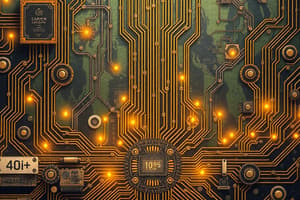Podcast
Questions and Answers
Which of the following is NOT a characteristic of passive components?
Which of the following is NOT a characteristic of passive components?
- They can amplify voltage. (correct)
- They include resistors and capacitors.
- They have no capacity to rectify supply.
- They are essential in circuit assembly.
What is one primary function of resistors in electronic circuits?
What is one primary function of resistors in electronic circuits?
- To increase voltage
- To store energy
- To rectify alternating current
- To limit current (correct)
In circuit applications, how do resistors contribute to LED functionality?
In circuit applications, how do resistors contribute to LED functionality?
- They produce sound frequency.
- They control current flow. (correct)
- They enhance brightness.
- They provide insulation.
What function do voltage dividers serve in a circuit?
What function do voltage dividers serve in a circuit?
Which of the following is NOT an application of resistors?
Which of the following is NOT an application of resistors?
What is meant by the term 'current' in electrical circuits?
What is meant by the term 'current' in electrical circuits?
Which of the following describes resistors in terms of their electrical properties?
Which of the following describes resistors in terms of their electrical properties?
Which function align with the use of variable resistors in circuits?
Which function align with the use of variable resistors in circuits?
What is the primary function of a rheostat?
What is the primary function of a rheostat?
Which of the following best describes how a trimmer resistor operates?
Which of the following best describes how a trimmer resistor operates?
What distinguishes non-linear resistors from linear resistors?
What distinguishes non-linear resistors from linear resistors?
What is the role of a thermistor?
What is the role of a thermistor?
How do photo resistors (LDRs) respond to light?
How do photo resistors (LDRs) respond to light?
What does capacitance refer to in a capacitor?
What does capacitance refer to in a capacitor?
What occurs when a capacitor is connected to a battery?
What occurs when a capacitor is connected to a battery?
Which of the following statements about resistors is true?
Which of the following statements about resistors is true?
What are the two basic types of linear resistors?
What are the two basic types of linear resistors?
Which type of fixed resistor is typically used in high power applications?
Which type of fixed resistor is typically used in high power applications?
What is the primary function of a carbon film resistor?
What is the primary function of a carbon film resistor?
What describes a potentiometer?
What describes a potentiometer?
Which statement is true about variable resistors?
Which statement is true about variable resistors?
What material is primarily used in a carbon film resistor?
What material is primarily used in a carbon film resistor?
What defines a fixed resistor?
What defines a fixed resistor?
What characterizes wire wound resistors?
What characterizes wire wound resistors?
What is the function of the resistor in a simple LED circuit?
What is the function of the resistor in a simple LED circuit?
During the forward bias condition, how do electrons move within an LED?
During the forward bias condition, how do electrons move within an LED?
What phenomenon describes the light emission from an LED?
What phenomenon describes the light emission from an LED?
What happens to the light intensity as the forward voltage applied to an LED increases?
What happens to the light intensity as the forward voltage applied to an LED increases?
Which of the following correctly describes the forbidden energy gap?
Which of the following correctly describes the forbidden energy gap?
In standard diodes, the energy released during electron recombination is primarily in the form of what?
In standard diodes, the energy released during electron recombination is primarily in the form of what?
What causes the light emission in an LED during the recombination process?
What causes the light emission in an LED during the recombination process?
What is the valence band in relation to an atom in a material?
What is the valence band in relation to an atom in a material?
What happens to the depletion region when a diode is under reverse bias conditions?
What happens to the depletion region when a diode is under reverse bias conditions?
Which statement accurately describes forward bias in a diode?
Which statement accurately describes forward bias in a diode?
How do LEDs emit light?
How do LEDs emit light?
What characteristic of light-emitting diodes (LEDs) allows them to emit light of different colors?
What characteristic of light-emitting diodes (LEDs) allows them to emit light of different colors?
In reverse bias, what effect does connecting the anode of a diode to the negative terminal have?
In reverse bias, what effect does connecting the anode of a diode to the negative terminal have?
What defines the region known as the depletion region in a pn junction?
What defines the region known as the depletion region in a pn junction?
What is the key difference between depletion layers in forward bias and reverse bias conditions?
What is the key difference between depletion layers in forward bias and reverse bias conditions?
How does reverse bias affect the flow of current in a diode?
How does reverse bias affect the flow of current in a diode?
Flashcards are hidden until you start studying
Study Notes
Passive Components
- Passive components have inactive functions and do not amplify voltage or rectify supply.
- They are essential for building electronic circuits.
- Common passive components include resistors, capacitors, inductors, transformers, diodes, thermistors, varactors, and transducers.
Resistors
- Resistors control current flow by offering resistance, opposing electric current movement.
- Used to limit current, divide voltage, and set biasing conditions in circuits.
- They are two-terminal devices that are color-coded for identification.
Applications of Resistors
- Vital for circuit functions, allowing current flow.
- Serve as voltage dividers, heating elements, variable resistors, and in timing applications.
- Regulate operations in devices like LEDs and transistors.
Functions in Circuits
- Resistors manage circuit tasks such as motor speed control and amplifier volume adjustment.
- They help in reducing current flow, regulating signal levels, and dividing voltages.
Types of Resistors
-
Linear Resistors: Their resistance changes with temperature and voltage. Divided into:
- Fixed Resistors: Have a specific resistance value, used to set correct circuit conditions.
- Variable Resistors: Resistance can be adjusted.
-
Fixed Resistor Types:
- Wire Wound Resistors: Made from conductive wire wound around a non-conductive core; used in high power applications.
- Carbon Film Resistors: Use a carbon film for current limitation; generally fixed value.
Variable Resistors
- Include a sliding contact tapping onto a fixed resistor.
- Types include:
- Potentiometer: A three-terminal adjustable voltage divider.
- Rheostat: Manually controls current flow by adjusting resistance.
- Trimmer Resistor: Mechanically adjustable for fine-tuning resistance.
Non-Linear Resistors
- Respond differently based on voltage or temperature changes.
- Include:
- Thermistors: Respond to temperature variations.
- Photo Resistor (LDR): Resistance decreases with increased light intensity.
Capacitors
- Two-terminal devices that store energy as electric charge.
- Consist of two conductors separated by a dielectric material, exhibiting capacitance.
- Charge accumulation occurs creating an electric field across plates.
Diodes
- Allow current to flow in one direction, crucial for rectification.
- Function under two conditions:
- Forward Bias: Reduced potential barrier, allowing current flow.
- Reverse Bias: Increases potential barrier, blocking current.
Light Emitting Diodes (LEDs)
- Semiconductor devices emitting light when current flows through them.
- Electrons recombine with holes in the p-n junction, releasing energy as light.
- Doped heavily to produce colored light based on material and doping levels.
Electroluminescence
- The process through which LEDs emit light due to electric current.
- Light intensity increases with the forward voltage.
Energy Concepts
- Valence Band: The outermost electron orbital, occupied by electrons.
- Conduction Band: Higher energy orbitals allowing free movement of electrons, creating current.
- Forbidden Energy Gap: The energy difference between conduction and valence bands, where no electrons exist.
Summary of Bias Conditions
- In forward bias, current flows from positive to negative terminal; electron movement is opposite.
- In reverse bias, electron and hole movement prevents current flow, widening the potential barrier.
Studying That Suits You
Use AI to generate personalized quizzes and flashcards to suit your learning preferences.




